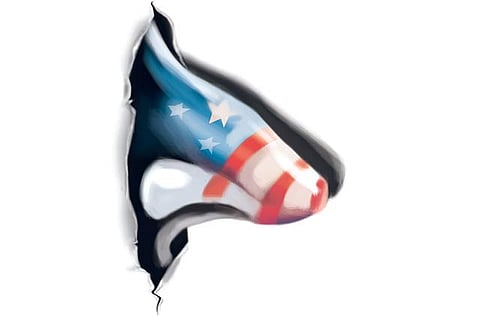People's power is in full swing
The dispossessed have sought to exercise their rights and live life to the fullest with respect, dignity and freedom

What is going on in the Arab street and centres of power? What we have been witnessing over the past month is people taking to the streets, defying authoritarian regimes, demanding change, challenging the grinding status quo and "Arab exceptionalism" which, according to Samuel Huntington, resisted the waves of democratisation.
This has been the norm for the past few decades. It was seemingly irreversible for the dispossessed yearning to exercise their rights and to live life to the fullest with respect, dignity and freedom.
The unprecedented courage of the people, buoyed by the information revolution across the Arab world, has clearly broken a lot of taboos, encouraged the huddled, tormented masses to air their grievances against decades of abuse, corruption and autocratic rule of repressive regimes. This wave is having a ripple affect across the Arab world, ushering in a new dawn.
People's power is in full swing and is spreading like wildfire across the Arab world. All of this is sending the whole region into a tail-spin, doing away with politics as usual and changing realities on the ground. But more importantly, strengthening the resolve of the marginalised, oppressed and shrinking middle classes who are leading the way and putting the region and Washington in a quandary as they contemplate the future.
People's power is sending unprecedented shock waves across the region. It is pushing aside traditional thinking about the exceptionalism of Arab politics in terms of democracy, representative government, accountability, checks and balances and the peaceful transfer of power.
Moral conundrum
Clearly, the US is in a moral conundrum. As with the Shah of Iran, it is trying to strike a balance "between Washington's demands for democracy among its friends and strategic coziness with autocratic regimes seen as key to stability in an increasingly complex world". As WikiLeaks revealed, US ambassador to Egypt Margaret Scobey wrote in late 2008, "Ongoing challenge remains, balancing our security interests with our democracy promotion efforts."
The WikiLeaks cables show the US was fully aware that deposed Tunisian president Zine Al Abidine Bin Ali was the head of a repressive police state "akin to a mafia". They also highlight the strategic significance of Egypt as a lynchpin to US strategy in the region. The US had made private calls to Mubarak to reform his regime and practices. But America's lip-service to and hollow remarks about supporting people's right to express their grievances are not enough and won't serve as a substitute for bolder steps and policies. Even the threat of reassessing foreign aid will not work. Clearly, the US is in a quandary over how to handle the Egyptian and other regional crises, in its attempt to balance its moral obligations and ideals without undercutting its strategic interests and the security of Israel.
Elliott Abrams, the US Deputy National Security Adviser in the George W. Bush administration, opined recently that Bush was right to demand freedom and democratisation in the Arab world. He quoted Bush on the lack of liberty in the Arab world. "Are the peoples of the Middle East somehow beyond the reach of liberty? Are millions of men and women and children condemned by history or culture to live in despotism? Are they alone never to know freedom and never even to have a choice in the matter?" But Abrams did not talk about the change of heart and back-pedalling of the Bush administration when the results of the polls across the region brought in the Islamists in the post 9/11 world.
It is appalling how the US misread and underestimated the severity of the situation in both Tunisia and, especially, in Egypt. It failed to foresee how the situation spiralled out of control to become the most serious foreign policy crisis for the Obama administration. The consequences of the upheaval in Egypt are the shifting sands and the collapse of the fragile balance of power. Add to that the failure of the US to use its leverage to safeguard the stability of the region and its allies and interests.
The courageous and unprecedented action by the people has let the genie out of the bottle and has unleashed what could be a new Arab order. That Arab order was not inspired or supported either by the US, with all its talk to validate its values and ideals, or by the Iranians. Their Supreme leader Ayatollah Ali Khamenei claimed that the Islamic Revolution, which toppled the US-backed Shah, could act as an inspiration to be emulated by the "Islamic liberation movement" to establish an "Islamic Middle East."
Maybe this is not what those demonstrators want. The ongoing struggle is a genuine and indigenous one, which is only a result of decades of repression, corruption and the tsunami of discontent, and not American backing or Iranian inspiration. But the reality of the moment is simple: people's power is in full swing, ousting the old order and practices, creating new realities, shaping and forming a new Arab world. All of this is leading as I have argued in an earlier piece to an "Arab Tipping Point". This undoubtedly will be a game changer for all.
Professor Abdullah Al Shayji is the Chairman of the Political Science Department — Kuwait University.


